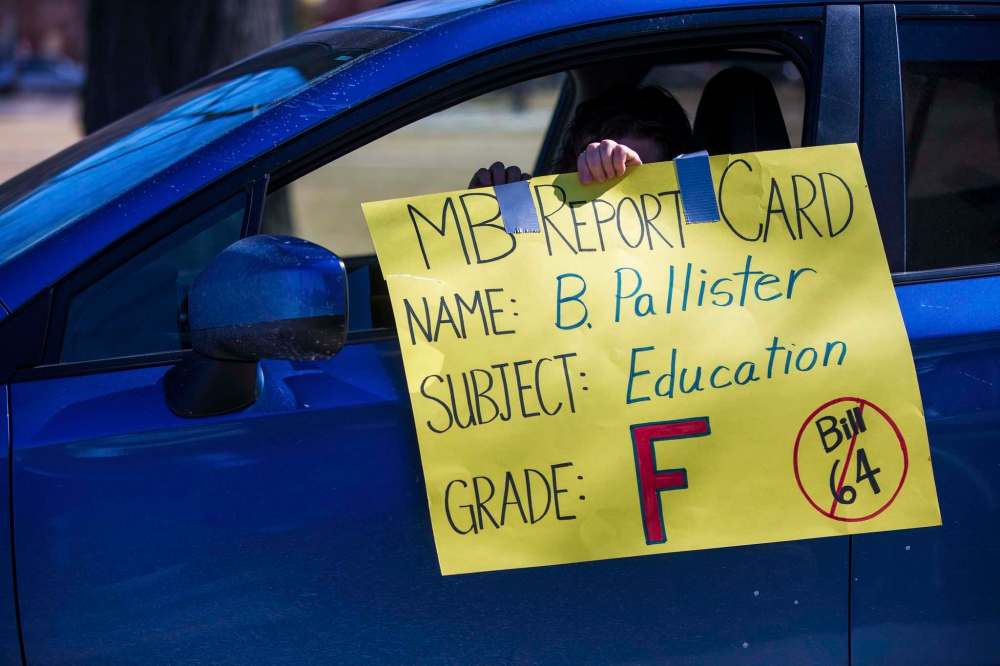Rally protests education reform
Demonstrators lay on the horn to express displeasure at government's bill
Advertisement
Read this article for free:
or
Already have an account? Log in here »
To continue reading, please subscribe:
Monthly Digital Subscription
$19 $0 for the first 4 weeks*
- Enjoy unlimited reading on winnipegfreepress.com
- Read the E-Edition, our digital replica newspaper
- Access News Break, our award-winning app
- Play interactive puzzles
*No charge for four weeks then billed as $19 plus GST every four weeks. Offer only available to new and qualified returning subscribers. Cancel any time.
Read unlimited articles for free today:
or
Already have an account? Log in here »
Hey there, time traveller!
This article was published 30/03/2021 (1367 days ago), so information in it may no longer be current.
Teachers, students and parents spent an hour of their spring break Wednesday doing loops around the Manitoba Legislative Building — with car horns blaring — in protest of sweeping reforms to the K-12 public school system.
Among the hundreds of drivers and passengers who hitched rides to a honk-a-thon against the Education Modernization Act was a protester carrying a homemade report card for Premier Brian Pallister; it bore a giant red “F.”
Manitoba unveiled Bill 64, which would replace elected school boards with a centralized authority of government appointees, two weeks ago.

“This (legislation) is not a modernization of education; it hurts students, it hurts families, it hurts teachers, and it silences communities,” Katie Hurst, an elementary arts teacher in Winnipeg, said at the Wednesday rally.
Hurst said the government should introduce universal nutrition, daycare and basic income programs if it wants to truly improve educational outcomes in a province with high child poverty rates.
Kara Godin, an educator at a rural Manitoba school, echoed those sentiments, saying immediate investments into breakfast programs would boost test scores. Instead, Godin said, education is continuously underfunded; funding for public schools won’t keep pace with inflation in 2021-22, for another consecutive year.
The protest organizers estimate more than 1,200 people showed up Wednesday.
Organizer Brianne Goertzen said she’s concerned the reforms will exacerbate existing inequities. A school trustee and parent, Goertzen questions how the province will recruit volunteer parents — especially in underprivileged communities, where parents might do shift-work or have multiple jobs — to take on the work paid trustees currently do.
Marginalized voices will go unheard as a central board makes decisions and only one regional entity of 15 represents Winnipeg, she said.
“That whole group could become a political pawn, of whoever the government of the time is, instead of being focused on the best interest of kids,” said Amy Warms, a rural teacher who drove an hour-and-a-half to attend the rally.
Warms said democracy might not be efficient, but there’s accountability in the trustee system. Parents often feel more comfortable bringing concerns to a neutral trustee than a teacher, she added.
While a growing number of opponents have voiced concerns about the reforms in recent weeks, one political scientist who was a trustee in the early 2000s has openly supported them.
Laura Reimer at the University of Manitoba said the new model will see cost savings by streamlining administrative duties, free up experienced superintendents (who will be “directors” in the new system) from spending so much time communicating with trustees, and address high rates of trustee acclamations in elections.
“It allows each of the regions to still have a heavy resource opportunity. Schools, theoretically, should get the support they need,” Reimer said.
The province has cited the complexities of managing 37 divisions during the COVID-19 pandemic as reason to create a centralized authority.
High school teacher Owen Bradshaw said the future of boards is a “red herring” when it comes to truly improving the quality of education.
“I don’t think the status quo is what we need, but I also don’t think that Bill 64 is the answer. It reminds me of a student who has written an awful lot in response to a question and said absolutely nothing,” said Bradshaw, who teaches English Language Arts in Winnipeg.
What would actually improve outcomes, he said, is capping K-4 class sizes and expanding numeracy and literacy coach rosters to set students up for foundational success in early grades.
maggie.macintosh@freepress.mb.ca
Twitter: @macintoshmaggie

Maggie Macintosh
Reporter
Maggie Macintosh reports on education for the Winnipeg Free Press. Funding for the Free Press education reporter comes from the Government of Canada through the Local Journalism Initiative.
Our newsroom depends on a growing audience of readers to power our journalism. If you are not a paid reader, please consider becoming a subscriber.
Our newsroom depends on its audience of readers to power our journalism. Thank you for your support.









